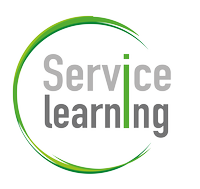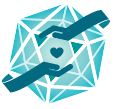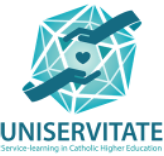Service-Learning
Serve, learn, reflect
 Service-Learning is a teaching approach that aims to incorporate social commitment into traditional academic teaching. The aim is for students to take part in a project or become involved in an organisation whose missions relate to social issues such as social justice, migration or the environment.
Service-Learning is a teaching approach that aims to incorporate social commitment into traditional academic teaching. The aim is for students to take part in a project or become involved in an organisation whose missions relate to social issues such as social justice, migration or the environment.
Service-Learning is based on three pillars: "Serve", "Reflect" and "Learn". Students give back to society by getting involved in a specific community, or by taking part in a solidarity project. This commitment experience is carried out in collaboration with an ASBL, an NGO or a local social enterprise. This kind of commitment allows students to open up to the world, take on responsibilities and become aware of their role in society. Students can then reflect on their experience, providing critical and structured feedback, and learn academically, civically and personally.
SERVING
Service to society takes the form of volunteering. Students make a significant contribution to the community. They respond to a real societal need, identified by the partner organisation. Their commitment must be based on the concept of horizontal solidarity: the relationship with the beneficiaries is reciprocal and mutually beneficial. The contact they make is more about collaboration than paternalistic help: the students also learn from the people they are helping.
LEARNING
The 'Learning' aspect covers a number of different aspects. Firstly, academic learning is reinforced. Students make links between the reality of the social issue and the content of the course. Secondly, students are personally affected, as service learning is aimed at general personal development. Civic engagement enables them to acquire new values, open up to the world and confront their initial beliefs. They develop various interpersonal skills and take on responsibilities. Finally, they learn about citizenship. Students understand their role by reflecting on the benefits that their training and the opportunities it offers in building a more tolerant and sustainable society.
REFLECTing
The 'Reflection' aspect of Service Learning is essential and is mainly about making the link between service and learning. Students use their theoretical knowledge and learn from their service experiences. However, in order for the lessons learned from these experiences to be deeply integrated and reused in their academic curriculum and in society as a citizen, a real process of reflection needs to take place. Time is therefore set aside for critical, structured and intentional reflection. This reflection takes place throughout the service-learning programme: before, during and after the engagement experience. This enables learning to be assessed on an ongoing basis, by recounting experiences and comparing initial expectations with final positions.
The Uniservitate network
 Uniservitate is an organisation whose aim is to promote Service-Learning in Catholic higher education institutions worldwide. The initiative, supported by PORTICUS and the Latin American Centre for Service-Learning (CLAYSS), aims to encourage institutions to offer integrated education to students. Through their studies, students will then be able to bring about systematic change in our society by becoming actively involved in the issues of our time.
Uniservitate is an organisation whose aim is to promote Service-Learning in Catholic higher education institutions worldwide. The initiative, supported by PORTICUS and the Latin American Centre for Service-Learning (CLAYSS), aims to encourage institutions to offer integrated education to students. Through their studies, students will then be able to bring about systematic change in our society by becoming actively involved in the issues of our time.
The UNamur is one of thirty universities supported by the Uniservitate network. It therefore benefits from support for the institutionalisation of Service-Learning. This network is organised into 7 regions: Asia and Oceania, Latin America, North America, North-West Europe, South-West Europe, Central-East Europe and the Middle East, and Africa. Each region is chaired by a "responsible" institution, a central hub.
Visit the UNISERVITATE website
 The UNamur is part of the North-West Europe region, along with the Catholic University of Lille and the KU Leuven, which chairs it. The KU Leuven therefore offers direct help and support to UNamur in its Service-Learning development project, through training courses for example.
The UNamur is part of the North-West Europe region, along with the Catholic University of Lille and the KU Leuven, which chairs it. The KU Leuven therefore offers direct help and support to UNamur in its Service-Learning development project, through training courses for example.














